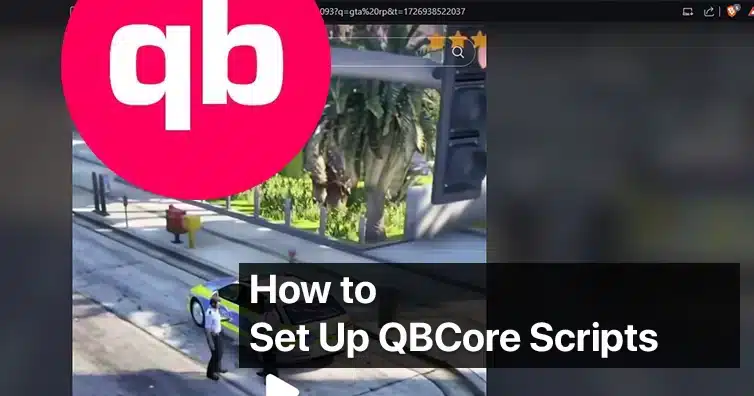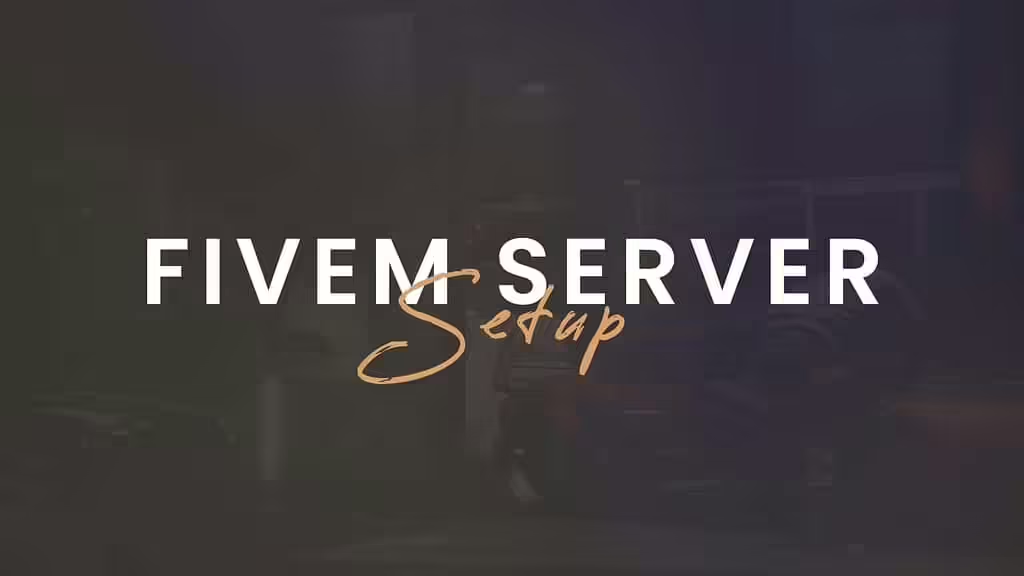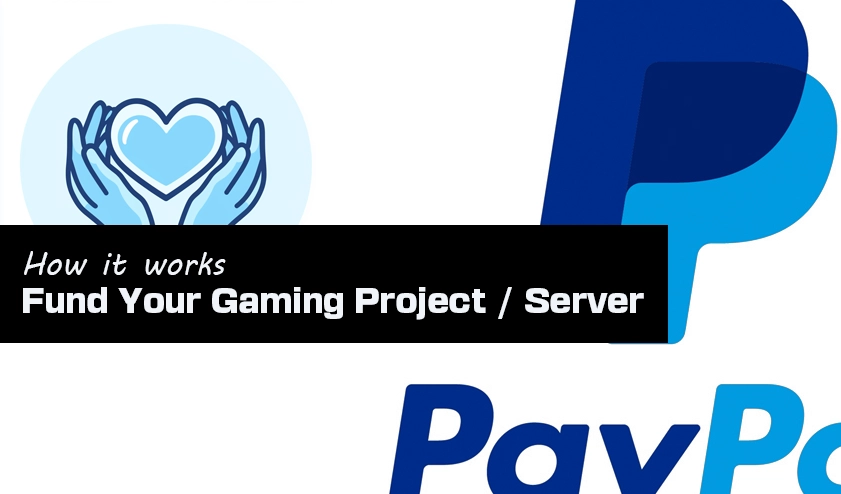Customizing QBCore scripts is essential for adapting your FiveM server to meet specific requirements, enhancing gameplay, and offering a unique experience. This comprehensive guide will explore the process of customizing existing QBCore scripts, providing in-depth explanations, practical examples, and insights on how to align them with your server’s needs.
Inhoudsopgave
It covers everything from basic edits to advanced configurations, making it suitable for both beginners and experienced developers in the GTA RP community.
Embracing Creativity and Customization for a Unique Roleplay Experience
Customizing QBCore scripts is not just about tweaking settings or adding new features; it’s about embracing creativity to craft a truly unique and immersive roleplay experience on your GTA RP server. By combining custom scripts, mods, and MLOs, server owners can shape the gameplay to reflect a specific vision or theme, such as a crime-ridden city, a futuristic dystopia, or a peaceful rural community. The freedom to alter everything from baan roles and animations to in-game events and player interactions allows for endless possibilities.
With thoughtful customization, you can not only enhance the realism and depth of roleplay scenarios but also keep players engaged with fresh content and innovative features. The key is to experiment, iterate, and keep pushing the boundaries of what’s possible with QBCore, making your server stand out in the competitive world of FiveM roleplay servers.
1. Understanding QBCore and Its Role in GTA RP Servers
To effectively customize QBCore scripts, it’s important to understand what QBCore is and how it functions in the context of GTA RP servers.

- What is QBCore?
QBCore is an open-source framework for FiveM servers, designed specifically for GTA RP (Roleplay) servers. It includes fundamental features for roleplay, such as inventory management, character creation, job systems, and various FiveM scripts for different gameplay elements. The framework serves as a foundation on which server owners can build, modify, and expand. - Why Customize QBCore Scripts?
Customization allows you to modify existing scripts or create new ones to suit the unique aspects of your server. Whether it’s tweaking job payouts, creating new MLOs (Map Load Objects) like custom interiors, or implementing unique gameplay features, customizing QBCore can significantly elevate the roleplay experience.
2. Setting Up Your Development Environment for Script Customization
To start customizing QBCore scripts and FiveM modificaties, you’ll need to set up a development environment that allows for smooth editing and testing.
- Recommended Tools:
- Text Editor or IDE: Gebruik hulpmiddelen zoals Visual Studio-code, Sublime Text, or Atom. Visual Studio Code is highly recommended for its Lua support and plugins that aid in development.
- QBCore Framework: Download the latest version from the official QBCore website.
- Local FiveM Server: Set up a local FiveM server for development. This allows you to test changes safely without affecting your live server.
- File Structure Overview:
QBCore scripts are structured into different folders, and understanding their purpose is key to customization:cliëntFolder: Contains client-side scripts executed on players’ machines (e.g., user interfaces, in-game prompts).serverFolder: Includes server-side scripts that handle backend operations, such as saving data to the database.sharedFolder: Holds scripts shared by both client and server, such as configuration files (config.lua).
3. Configuring Basic Settings
Start by modifying basic settings in the config.lua files, which usually control key aspects of scripts, such as:
Job Settings Example:
Config.Jobs = {
['police'] = {
label = 'Police Officer',
pay = 150, -- Set hourly pay
onDuty = true, -- Whether the job starts as on-duty
},
['mechanic'] = {
label = 'Mechanic',
pay = 100,
requiredItems = {'toolbox'}, -- Items required to perform the job
}
}
MLO Settings:
Config.MLOAccess = {
['nightclub'] = {'police', 'bouncer'}, -- List of roles allowed to access the MLO
['policestation'] = {'police', 'swat'}, -- Customizing access for specific roles
}
4. Editing Client-Side Scripts for Enhanced User Experience
Client-side scripts control the player’s interactions and can be customized to improve immersion in your GTA RP server.
Example: Customizing Player Interaction Prompts
Modify prompts that appear when players interact with in-game elements (e.g., shops, auto's, doors):
RegisterNetEvent('qb-shop:client:openShop', function()
local playerPed = PlayerPedId()
local coords = GetEntityCoords(playerPed)
local distance = #(coords - vector3(shopCoords.x, shopCoords.y, shopCoords.z))
if distance < 2.0 then
TriggerEvent('notification', 'Press [E] to open the shop', 'info') -- Customize this prompt
end
end)
Adding Custom Animations for Roleplay Scenarios
Create immersive roleplay moments by adding custom animations:
RegisterCommand('dance', function()
local playerPed = PlayerPedId()
TaskStartScenarioInPlace(playerPed, 'WORLD_HUMAN_DANCING', 0, true) -- Custom animation
end, false)
5. Modifying Server-Side Scripts for Backend Customization
Server-side scripts handle core gameplay functionalities such as data storage and backend operations.
Example: Customizing Job Payment Logic
You can modify server-side scripts to customize how jobs pay players:
RegisterServerEvent('qb-job:server:pay')
AddEventHandler('qb-job:server:pay', function(job)
local playerId = source
local playerData = QBCore.Functions.GetPlayer(playerId)
local salary = Config.Jobs[job].pay
if playerData.job.name == 'mechanic' then
salary = salary + 20 -- Extra pay for mechanics
end
playerData.Functions.AddMoney('bank', salary)
TriggerClientEvent('notification', playerId, 'You received your salary: $' .. salary, 'success')
end)
Integrating Custom MLOs with Server Scripts
Linking MLOs to server scripts can unlock new features like controlled access or role-based permissions:
RegisterServerEvent('qb-doors:server:toggleLock')
AddEventHandler('qb-doors:server:toggleLock', function(doorId, isLocked)
local playerData = QBCore.Functions.GetPlayer(source)
if playerData.job.name == 'police' then
-- Only police can unlock this door
Config.Doors[doorId].locked = isLocked
TriggerClientEvent('qb-doors:client:syncDoors', -1, Config.Doors)
else
TriggerClientEvent('notification', source, 'You don’t have permission to do that.', 'error')
end
end)
6. Adding New Features to Existing Scripts
Adding new features to QBCore scripts can provide custom gameplay experiences, from new roleplay jobs to interactive in-game objects.
Creating a Custom Job (e.g., Taxi Driver)
You can add a custom opdrachtscript that allows players to pick up and drop off passengers:
QBCore.Functions.CreateCallback('qb-taxi:server:StartJob', function(source, cb)
local player = QBCore.Functions.GetPlayer(source)
player.Functions.SetJob('taxi', 0) -- Assign the taxi job
cb(true)
end)
Implementing Custom Mods and Add-Ons
Add-ons such as car mods or custom scripts for weapons can enhance your server’s roleplay aspects. Integrate vehicle mods to make unique cars available for certain jobs, or add weapon mods for specific server events.
7. Best Practices for Customizing QBCore Scripts
To maintain server stability and ensure a smooth experience:
- Use Version Control:
Version control systems like Git allow you to keep track of changes and revert if necessary. They are invaluable for collaborative development. - Geef uw code op:
Add comments in the code to explain what each section does, especially in scripts you’ve heavily modified. - Create Backups:
Before implementing major changes, create backups to avoid losing progress. - Test on a Development Server:
Use a local or staging server for testing. This avoids disrupting live players with bugs or unfinished features.
8. Troubleshooting Common Issues in Custom Scripts
Here are some strategies for common problems:
- Debugging Script Errors:
Use the FiveM console to check for errors. For instance,attempt to index a nil valueindicates that a variable is not set or initialized. - Optimizing Performance:
If scripts cause lag, use FiveM’sresmonto identify which resource is consuming the most CPU or memory. - Compatibility Challenges:
When using third-party scripts or mods, ensure they are compatible with your QBCore version. Sometimes, you may need to adapt the code for seamless integration.
9. Advanced Customization: Creating Custom FiveM Scripts
If you wish to go further, consider writing your own FiveM scripts from scratch.
- Structure Your Script Properly:
Create a new script withcliënt,serverensharedfolders. Define dependencies infxmanifest.lua, specifying any mods, libraries, or assets. - Building Custom Logic:
Whether it’s a new heist mission, a custom vehicle dealership, or a fully scripted roleplay scenario, write client-side and server-side scripts to handle game logic, UI interactions, and database storage.
10. Learning from Community Resources
The FiveM community offers a wealth of information and support for customizing QBCore scripts:
- Forums and Discord Servers:
Join communities to share scripts, discuss mods, and get troubleshooting help. - Public Repositories on GitHub:
Explore GitHub projects related to QBCore, where you can find and adapt scripts for your server.
Conclusie
Customizing QBCore scripts is a powerful way to create a distinctive experience on your GTA RP server. By tailoring FiveM scripts, MLOs, mods, and gameplay features, you can offer unique roleplay scenarios that attract players. Remember to follow best practices, such as keeping backups, commenting your code, and thoroughly testing customizations on a development server. With patience and practice, you’ll master QBCore scripting and unlock endless possibilities for your server’s roleplay adventures.




